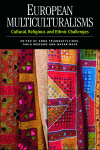
Tariq Modood, Professor of Sociology, Politics and Public Policy
Are multiculturalism and nationalism necessarily opposed to each other? Well, the pioneering political act of multiculturalism is widely regarded to be Prime Minister Trudeau’s famous declaration in 1971 that Canada was a multicultural nation. This emphasis on multiculturalising the nation was the archstone of the Swann Report on multicultural education in Britain in 1985.
‘Rethinking the national story’ was the most important – yet the most misunderstood – message of the report of the Commission on Multi-Ethnic Britain (2000; aka The Parekh Report). It argued that the post-immigration challenge was not simply eliminating racial discrimination or alleviating racial disadvantage, important as these were to an equality strategy. Rather, the deeper challenge was to find inspiring visions of Britain, which showed us where we were coming from and where we were going, how history had brought us together and what we could make of our shared future. The Commission did not want to paint the past or the present in rosy, pastel colours, recognising as it did that conflict and contestation of narratives was ever-present, but thought that through dialogue and egalitarian commitment a vibrant, new Britishness at ease with itself beckoned.
It may seem that since that report of 2000 we have retreated from this project of building a multicultural nationality. Actually, what is interesting is that the crises of this century have led governments to pursue a more active nation-building approach – an approach which is not inimical to the idea of a multicultural society. The reaction to the Parekh Report in 2000 was somewhat complacent in dismissing the idea of active nation-reforming, rather being content with what the Report identified as ‘multicultural drift’. Since then, the more fearful post-9/11 times have made governments recognise that national cohesion is not simply a given but must also be made.
For many, this is about proclaiming the death of multiculturalism. Yet, given that from its inception multiculturalism was a project of nation-remaking through including newly settled groups, I think it remains as pertinent as before. We may now want to express ourselves in terms of the priority of ‘integration’ but we have to understand that there are different modes of integration and none of them – including integrationist-multiculturalism – are to be dismissed. Because in a multicultural society different groups will integrate in different ways. Some ethnic minorities may wish to assimilate, some to have the equal rights of integrated citizens, some to maintain the cultural differences of their group identities, and some to be free to choose cosmopolitan mixed identities. Equally, the majority society may look on different minority groups in a variety of diverse ways. Each approach has a particular conception of equal citizenship but the value of each can only be realised if it is not imposed but is the preferred choice of minority individuals and groups. No singular model is likely to be suitable for all groups – or indeed for any one group. To have a reasonable chance of integrating the maximum number of members of minority groups, none of these political responses should be dismissed.
Moreover, assimilation may be more appropriate in terms of national language acquisition before naturalization; individualist-integration may provide the model for non-discrimination in the labour market; yet multiculturalism may be the basis for supplementing electoral representation (where minorities are under-represented) and in creating new attitudes of inclusivity and in rethinking national identities. Thus perhaps the ultimate meaning of multiculturalism is not as one mode of integration but as the perspective which allows all modes of integration their due, including, crucially, communitarian multiculturalism.
This is particularly important at a time when many centre-left critics of multiculturalism celebrate hybridity, fluidity and cosmopolitian identities. These are indeed worthy of celebration but we should not overlook the conservative, community-maintaining aspect of multiculturalism. Communitarian multiculturalism may currently be viewed as undesirable by various publics and policymakers. Yet, given how central groups such as Muslims have become to the prospects of integration on a number of fronts, it is unlikely that integration can be achieved without some element of this approach. Perceptions of Muslims as groups, by themselves and by non-Muslim majorities, are hardening. The key question is not how to decollectivise Muslims but whether they are to be stigmatised as outsiders or recognised as integral to the polity. The enlargement, hyphenation and internal pluralising of national identities is essential to an integration in which all citizens have not just rights but a sense of belonging to the whole, as well as to their own ‘little platoon’.
Tariq Modood has just published Multiculturalism, Second Edition, 2013 (details available at www.tariqmodood.com) and will be presenting at ‘The politics of diversity and One Nation’ Tuesday 30 April, 4.30-6 p.m., Committee Room 9, House of Commons (bookings by email to events@demos.co.uk)

